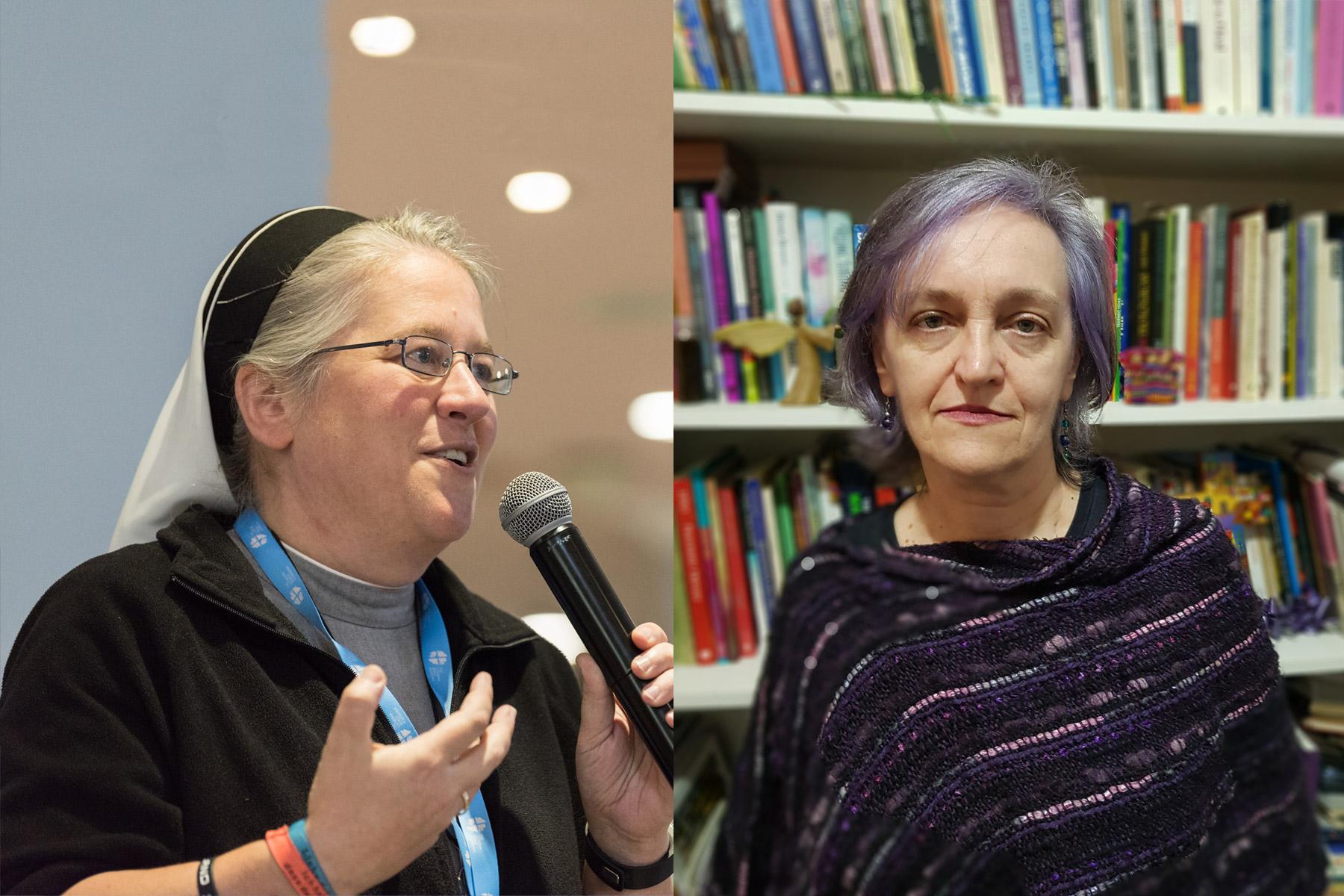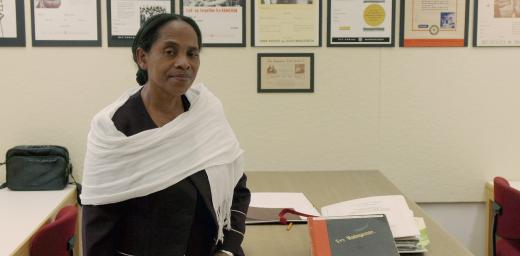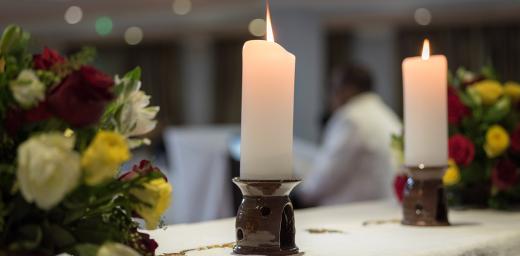Being Lutheran: How theological education leads to transformation

Speakers at Being Lutheran Webinar 2: (Left) Sister Dr Nicole Grochowina, Germany, and Rev. Dr Marcia Blasi, Brazil. Photo: LWF/Albin Hillert & Faculdades EST
Second webinar explores how COVID-19 pandemic calls for new ways of nurturing community
(LWI) – How can Lutheran theological education and formation, spirituality and shared faith experiences in community transform social, political and church-related systems of power?
The Lutheran World Federation (LWF) explored these questions at its recent Being Lutheran Webinar, which registered nearly 140 participants from all parts of the world. Two presenters, Rev. Dr Marcia Blasi from Brazil and Sister Dr Nicole Grochowina from Germany shared insights as teaching theologians, and on the impact of the COVID-19 pandemic in their respective settings.
The webinar on 5 August was the second in a monthly series that began in July on the LWF study process on Lutheran identities. The process, which started in October 2019, is coordinated by Rev. Dr Chad Rimmer, LWF program executive for Lutheran Identity, Communion and Formation.
“We are shaped by our context,” were the opening remarks by Blasi, professor of theology and coordinator of the Gender and Religion program at Falcudades EST, a theological institution of the Evangelical Church of the Lutheran Confession in Brazil. Introducing the “school of theology rooted in the Lutheran tradition and liberation theologies,” she said feminist theology has been part of its curriculum for 30 years.
The college in São Leopoldo, southern Brazil, enrolls students from all parts of the country and the Latin American region, and from different denominations. “We are Lutheran and open to all,” she said.
The students mostly come from areas with a poor education system, predominantly public schools, which in Brazil lack many things, Blasi explained. Critical education in the gender and religion program therefore requires recognition of “your own vulnerability in this world,” including learning how to transform challenges into opportunities, how to listen to fears, anxiety, hope and gratitude.”
COVID-19: Increased violence against women and children
Explaining the impact of the novel coronavirus disease, Blasi said southern Brazil, which is among the country’s worst hit regions, was experiencing its “hardest weeks” at the beginning of August. “There are more than 98,000 families mourning the loss of someone they love; there is pain, fear and anxiety all around,” she said of the fatalities, which had surpassed the 100,000 mark by 10 August in a country with over 3 million reported cases according to the World Health Organization.
The COVID-19 restrictions significantly impact the relationship between genders in a country with high levels of gender-based violence, with “violence against women, children and the elderly increasing during the pandemic,” she said. The pandemic “has made visible the many injustices that permeate the fabric of our societies—economic, racial, gender, and sexual identity,” including a stronger resurgence of patriarchy and a widening gap between the poor and the rich. What is worse, she noted, “is that Christian and religious language is being used to reinforce this unjust system.”
‘No way for theology to be neutral’
Like other institutions, EST changed its teaching to online classes on 16 March, “which challenges us beyond anything we experienced before.” The institute’s teaching methodology, Blasi explained, is shaped by a transformative pedagogy, based on Brazilian philosopher Paulo Freire’s notion of working and creating knowledge together, including physical human interaction. “How do we do that in an online class?” There is no easy answer, she noted, and both students and teachers are still learning.
There is no way for theology to be neutral
Concluding, she said theological institutions and churches need transformative theology to address the collective trauma of COVID-19 and beyond, including discourse around power, gender, class and race. “There is no way for theology to be neutral,” she emphasized.
Sharing life in community
Sister Grochowina, a member of the Communität Christusbruderschaft religious order of the Evangelical Lutheran Church in Bavaria, in Selbitz, Germany, spoke about how worshipping, and sharing life in community (or communio) shapes theological and ethical consciousness, including response to the COVID-19 pandemic.
She explained that in the current global health crisis, whereby it has become impossible to encounter one another together in churches, sharing songs, prayers and experiences, many people “strongly realize that faith and communio—for good reason—are closely linked.”
Grochowina, who teaches history with a focus on the communal aspects of women’s spirituality, identified four levels of discernment that should be considered in order to channel the transforming power of communio. The first is to address the relationship between origin and tradition such that the struggle between both dimensions does not bring to an end the formation of individual and collective spirituality. Secondly, the level of discernment between individual and collective needs calls for a heathy rhythm of solitude and communio, with “no need to flee from” either of the two.
Addressing power and generational needs
Thirdly, when the open and hidden use of power is not addressed, established hierarchies might make it “hard to resist the temptation to support one’s needs” by using the authority of God’s word to enforce decisions. This, she noted, could result in violent manipulation of the language of faith, and place very high expectations on a single person’s discernment and decision making. Communio in this respect is not only helpful, but it also fulfills the demanding task of discerning a strong emphasis on God’s will.
Communio is the backbone of a strong identity that does not fear new, foreign or even strange attitudes and expressions of life.
Finally, the needs of the different generations must be considered to ensure that the power of the incoming generation is “not channeled by the speed of the generation in place,” Grochowina said. Concluding, she argued that a well-functioning relationship between faith and communio helps every community member live their calling, and become a strong witness beyond that circle. “Communio is the backbone of a strong identity that does not fear new, foreign or even strange attitudes and expressions of life,” she added.
Feedback from breakout groups highlighted the challenges and systemic resistance to addressing real theological and ethical discernment at the parish and community level, which have become more acute due to the COVID-19 restrictions. Participants also identified the need to maintain bonds of community that support the mental health of members and relationships that open up opportunities in times of economic stress.
Summing up, Rimmer emphasized the Lutheran tradition emphhasis on theological studies and reflection as “a driver of transformation.” This includes critique of power in the state, church, and social relationships with one another and the Earth. The COVID-19 period, he noted, had unmasked domestic and gender-based violence, and many economic, ecological and racial injustices that require systemic change in society and in the church. “Patriarchal systems of ‘power over’ must be transformed into just and sustainable ways of living together.”
He described Lutheran methods of theological reflection as “a kind of liberation theology that begin with our daily lived experiences, and discern how the gospel frees us to advocate for change.” For Rimmer, the deep spirituality of prayer and communal worship in which theological reflection is embedded, helps to form critical consciousness of unjust power structures, and discern how to reform them. “Our living tradition offers hope for a world that is crying out for faithful transformation.”
The next Being Lutheran webinar on 2 September will focus on indigenous traditions within the Lutheran communion.




